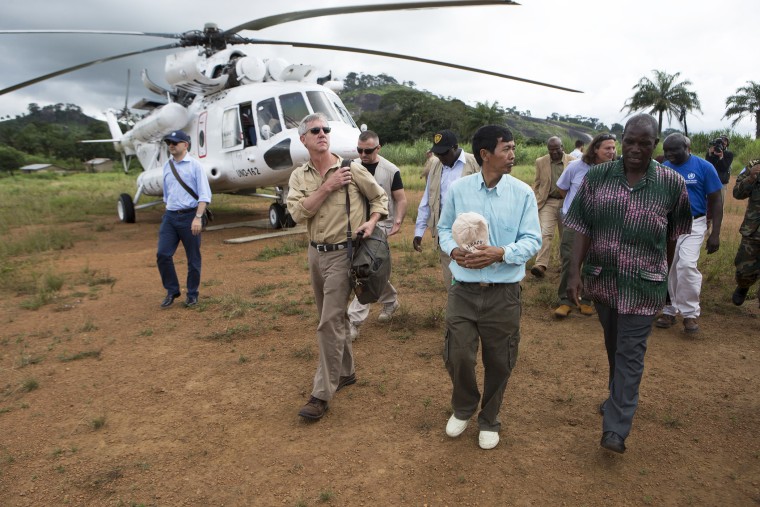Before Thomas Eric Duncan boarded his flight from Liberia on Sept. 19, health officials said he showed no signs of being infected by the Ebola virus. His temperature was just 97.3 degrees. Duncan didn't begin showing symptoms until about four or five days after he touched down on U.S. soil, and officials initially believed he had by that time come in contact with as many as 100 people.
A week since Duncan's positive diagnosis for Ebola, the first case found in the U.S. since the outbreak began, the Obama administration is still undecided on options to minimize the chance of Ebola making its way from its source in West Africa. The Centers for Disease Control has already implemented travel warnings, and officials are considering ways to screen airline passengers both at the source and in the United States. For some pundits on the right, however, the answer is clear.
"Here's what you do: you stop the air travel from those hotbed areas," conservative TV host Glenn Beck said on his program last week. "You start looking at our borders and seeing who's coming across."
Photo essay: Ebola continues its deadly march
More than 3,400 people have already died because of Ebola, for which there is no cure. Fueling fears of an American Ebola scare, conservatives are turning public health concerns around the first reported case in Dallas, Texas, into an issue of immigration with calls to crack down on who is allowed to enter the country.
“I think at the very least there needs to be a discussion about airline travel between the countries that have the rip-roaring, raging disease,” Kentucky Sen. Rand Paul told Beck. Ohio Sen. Rob Portman said the U.S. needs to be more proactive in screening at airports. Louisiana Gov. Bobby Jindal flatly said the U.S. should "stop accepting flights" from Ebola-stricken countries. Rush Limbaugh suggested the Obama administration is downplaying travel concerns out of a conspiracy to protect a so-called “amnesty" agenda.
Public health officials have repeatedly said that outright bans on travel between the U.S. and the three main West African countries at the source -- Guinea, Liberia and Sierra Leone -- would back backfire on efforts to keep the disease from spreading.
During an appearance Monday on "Fox & Friends," National Institute of Allergies and Infectious Diseases Director Dr. Anthony Fauci stressed that the United States should not considering completely isolating West Africa.
"When you completely seal off and don't let planes in or out of the West African countries involved, then you could paradoxically make things much worse," Fauci said. "It's completely impractical and, in fact, from a public health standpoint, not helpful to do that, and I think every public health official feels that way."
Public health experts point to the compounding problems when countries try to isolate an entire region. Cutting off travel means restricting access to much-needed medical supplies and qualified personnel to contain the epidemic. Not to mention, one of the largest Liberian population outside of Africa is in New York -- cutting off dual citizens or businessmen and women from traveling back and forth is simply unfeasible in keeping parts of the economy running. A travel ban would severely clamp down on First Amendment rights in not allowing journalists into West Africa to report on the latest developments.
“Even if we tried to close the border, it wouldn’t work,” CDC Director Tom Frieden said last week on "Morning Joe." “People have a right to return. People transitioning through could come in. And it would backfire, because by isolating these countries, it’ll make it harder to help them, it will spread more there and we’d be more likely to expose it.”
